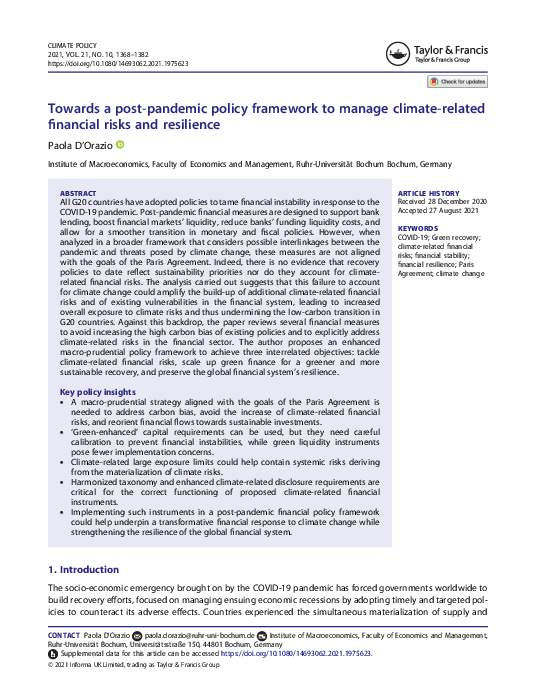Towards a post-pandemic policy framework to manage climate-related financial risks and resilience

2021
21
10
1368-1382
epidemic disease ; economic recovery ; environmental policy ; financial policy ; financial system ; climate change
Business economics
https://doi.org/10.1080/14693062.2021.1975623
English
Bibliogr.
"All G20 countries have adopted policies to tame financial instability in response to the COVID-19 pandemic. Post-pandemic financial measures are designed to support bank lending, boost financial markets' liquidity, reduce banks' funding liquidity costs, and allow for a smoother transition in monetary and fiscal policies. However, when analyzed in a broader framework that considers possible interlinkages between the pandemic and threats posed by climate change, these measures are not aligned with the goals of the Paris Agreement. Indeed, there is no evidence that recovery policies to date reflect sustainability priorities nor do they account for climate-related financial risks. The analysis carried out suggests that this failure to account for climate change could amplify the build-up of additional climate-related financial risks and of existing vulnerabilities in the financial system, leading to increased overall exposure to climate risks and thus undermining the low-carbon transition in G20 countries. Against this backdrop, the paper reviews several financial measures to avoid increasing the high carbon bias of existing policies and to explicitly address climate-related risks in the financial sector. The author proposes an enhanced macro-prudential policy framework to achieve three interrelated objectives: tackle climate-related financial risks, scale up green finance for a greener and more sustainable recovery, and preserve the global financial system's resilience."
Digital
The ETUI is co-funded by the European Union. Views and opinions expressed are however those of the author(s) only and do not necessarily reflect those of the European Union or the ETUI.